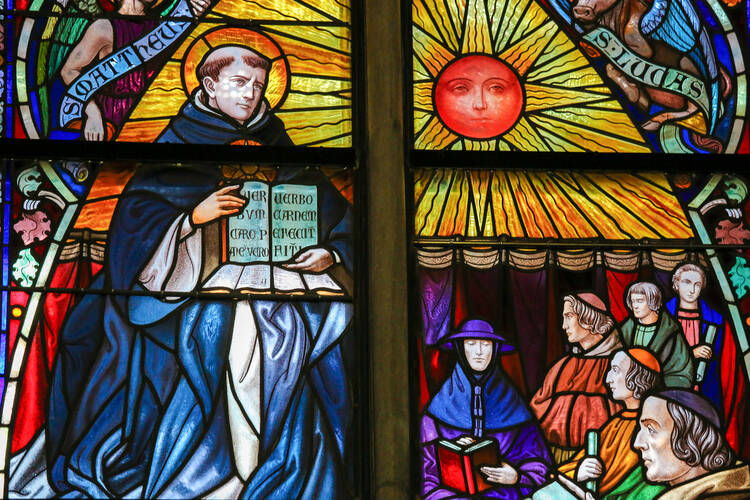A Reflection for the Fifth Sunday in Ordinary Time
Isaiah 6:1-2a, 3-8 1 Corinthians 15:1-11, Luke 5:1-11
In his classic study, The Silence of St. Thomas (1957), Josef Pieper drew on canonization accounts to share an oft-told story about Thomas Aquinas, whose influence in Catholicism is surpassed only by Sts. Paul and Augustine.
On the Feast of St. Nicholas, in the year 1273, as Thomas turned back to this work after Holy Mass, he was strangely altered. He remained steadily silent; he did not write; he dictated nothing. He laid aside the Summa Theologica on which he had been working. Abruptly, in the middle of the treatise on the Sacrament of Penance, he stopped writing. Reginald, his friend, asks him, troubled: “Father, how can you want to stop such a great work?” Thomas answers only, “I can write no more.” Reginald of Piperno seriously believed that his master and friend might have become mentally ill through his overwhelming burden of work. After a long while, he asks and urges once again. Thomas gives the answer: “Reginald, I can write no more. All that I have hitherto written seems to me nothing but straw.” Reginald is stunned by this reply.
St. Thomas never wrote again, though much has been penned about this great theologian’s descent into silence before his death in 1274. What should we make of it?
What is sin but that part of our lives that is not of God?
At least this: The world is bigger than our minds, though there is nothing in its nature preventing us from someday knowing all there is to know about it. That alone is quite extraordinary. The world need not lie open to our minds. The fact that our minds are conformed to the world should be noted. It is not a given! Put another way, why is it that our minds and the world are aligned? Who or what is responsible?
That “who” or “what” is the meaning of the word “God.” We use the term to designate the mystery from which we emerge and in which we rest. And unlike our growing mastery of the world around us, we will never fathom this mystery because it encompasses us. Indeed, it’s the word we use for what exceeds us.This is the mystery that St. Thomas experienced, ever so directly, one night in prayer. He could write no more because the distance between our world of words and the mystery that is God overwhelmed him.
It is fascinating that Thomas was writing on penance when he was overcome. One of the ways we know that we have been graced, that we have truly been touched by God, is a recognition of our sinfulness, our self-induced limitation before the face of God.
So it was for the prophet Isaiah:
Woe is me, I am doomed!
For I am a man of unclean lips,
living among a people of unclean lips;
yet my eyes have seen the King, the Lord of hosts! (Is 6:5).
And for St. Peter:
Depart from me, Lord, for I am a sinful man (Lk 5:8)
And St. Paul defines his vocation as an awareness of his sin.
Last of all, as to one born abnormally,
he appeared to me.
For I am the least of the apostles,
not fit to be called an apostle,
because I persecuted the church of God (1 Cor 15:7-8).
Why sinfulness? Why does this self-awareness accompany even a glimpse of the awesome mystery from which we emerge?
He could write no more because the distance between our world of words and the mystery that is God overwhelmed him.
The answer is simple but telling. What is sin but that part of our lives that is not of God? However you might enumerate commandments and precepts, they all come down to this: There are times when we close ourselves to growth, when we do not patiently receive the gift that is life. We grasp instead of letting goodness seep into us.
Thomas Aquinas was, of course, a saint. How much sin could have shamed him into silence? Compared to many of us, surely not much. Yet it is only the would-be saints who can see their sin. By its nature, sin blinds. The final silence of this prolific and holy theologian says more than anything he ever wrote about the immensity of truth, goodness and beauty that is God.
“It’s wanting to know that makes us matter. Otherwise we’re going out the way we came in,” the playwright and screenwriter Tom Stoppard once said. That is indeed who we are, who we should be. Yet a recognition of our sinfulness falls upon us when we receive even a glimpse of the living God. Seeing the ocean, the eye turns teardrop. The bead longs to return to its briny bosom.








